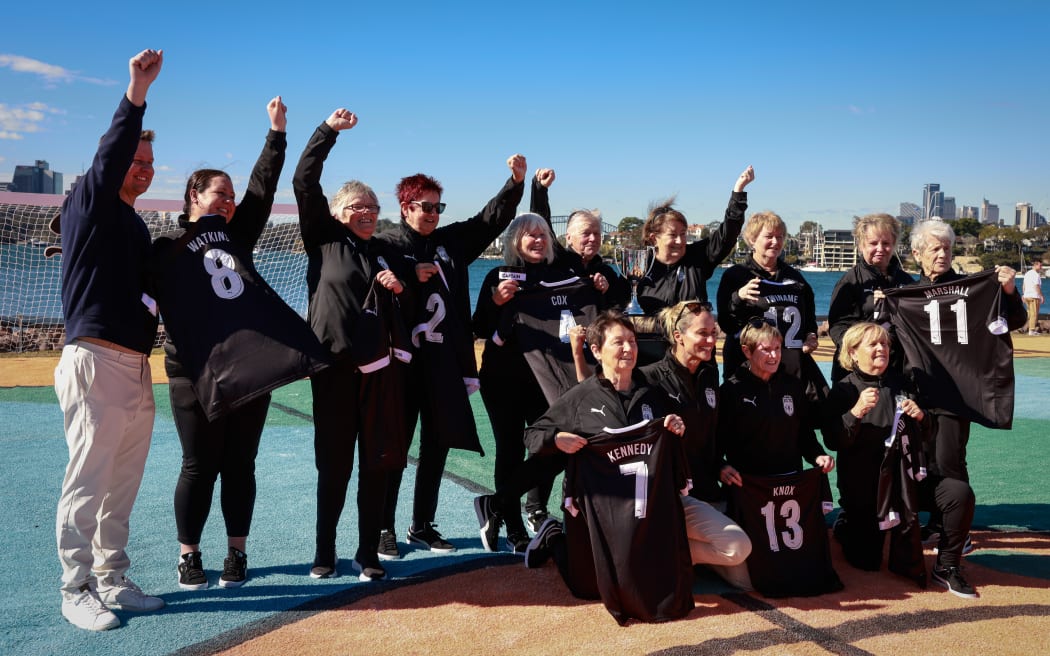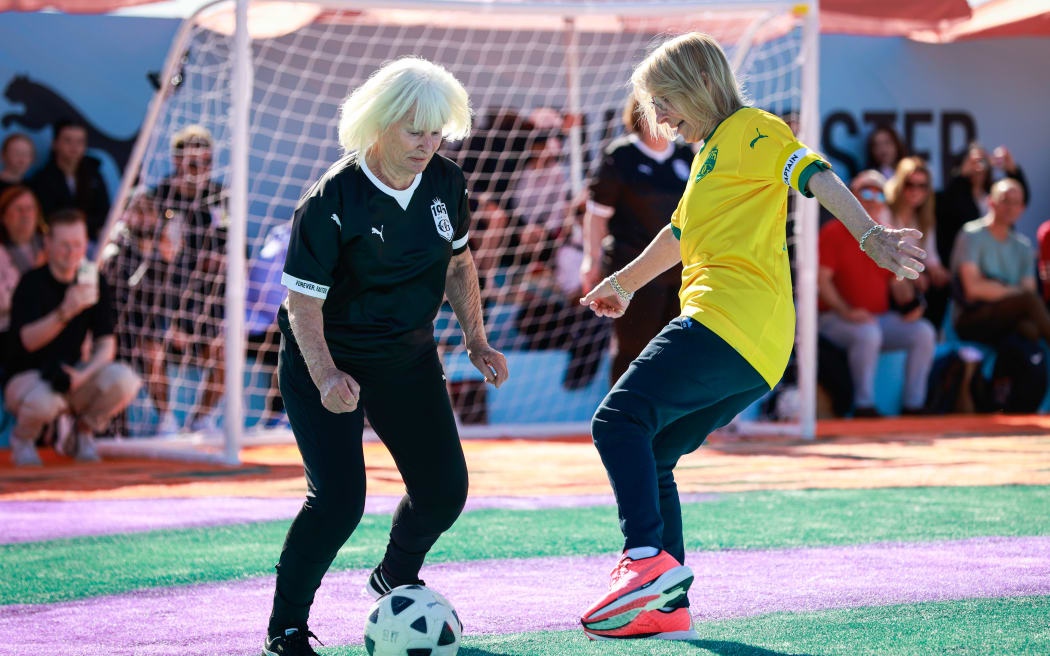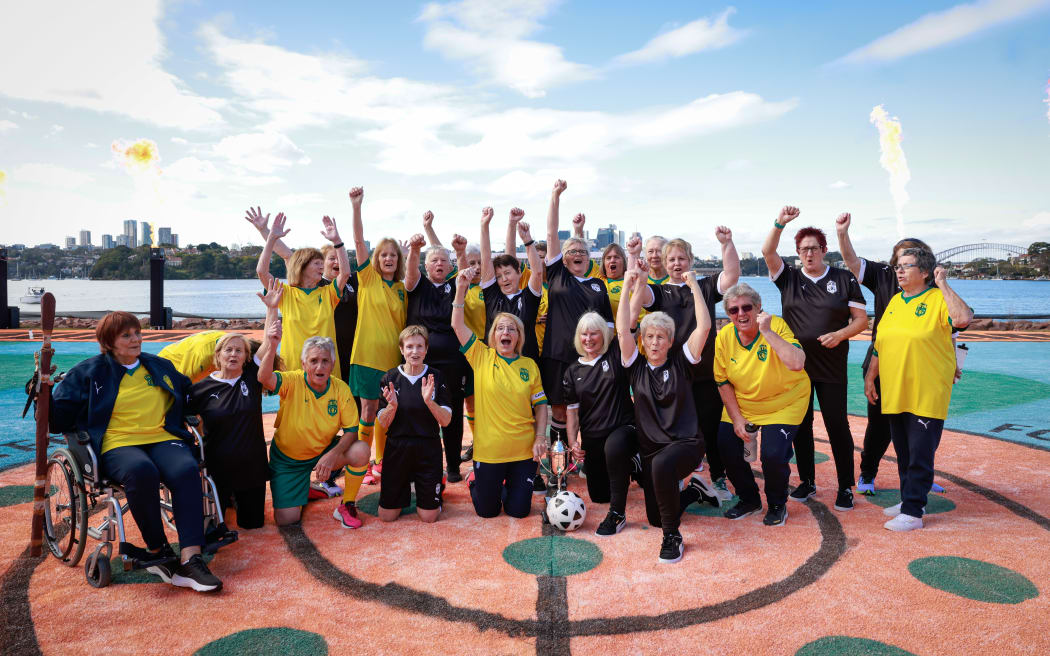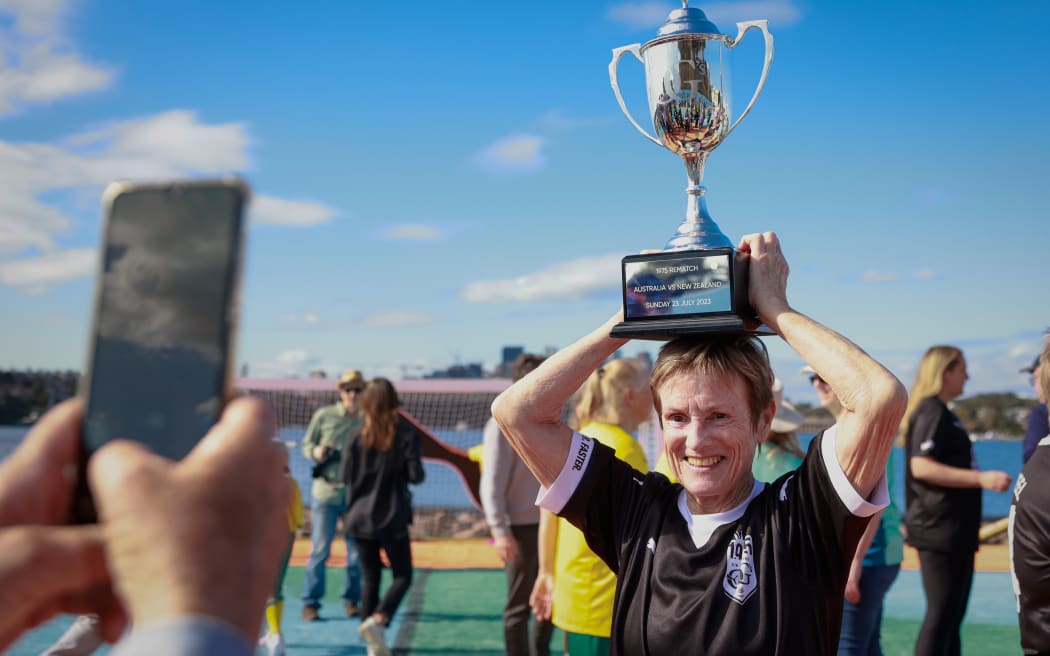First Football Ferns and 1975 Asian Cup winners are still fighting to tell their story
By Jeff Kassouf, for The Guardian

New Zealand players pose with their jerseys on PUMA Island during a 1975 Australia v New Zealand reunion on 21 July, 2023 in Sydney, Australia.
Photo: Hanna Lassen / Getty Images for PUMA
While much has changed since New Zealand won the Women’s Asian Cup in 1975, their triumph remains largely unrecognised.
Isobel Kennedy can still remember arriving home in Auckland, New Zealand in 1975. She and her teammates had just won the first Women’s Asian Cup, and they were on top of the world.
Back home, they remained anonymous. Some family and friends welcomed them on their return from the tournament in Hong Kong, but there were no reporters, no cameras, no jubilant fans. There was no indication anyone was aware that New Zealand had won the first four international matches they ever played, to prevail as the inaugural women’s champions of a new continental competition.
Their story is eerily similar to that of the 1991 World Cup-winning USA team, winners of the inaugural tournament who returned home to blank stares. But unlike that US side, which featured future global superstars such as Michelle Akers, Mia Hamm and Brandi Chastain, this New Zealand team faded into history.
For most of them, those four international appearances in Hong Kong were the only they ever made for New Zealand.
“I couldn’t watch a game of soccer for 40 years,” Marianne Poole, one of the players in that 1975 New Zealand squad, told the Guardian. “Honestly, I’m a doer, not a watcher.”
The national team did not play again for the next four years, leaving the original 15 players to compete for their local club sides or move on from the sport entirely. Plenty of them did the latter.
“We were the ones that started it all, but we hit a cul-de-sac and we didn’t go any further,” says Nell Jongeneel, one of the players in that 1975 team.

Barbara Cox and Pat O’Connor in action in the OG Australia v New Zealand rematch on PUMA Island 22 July, 2023 in Sydney, Australia.
Photo: Hanna Lassen / Getty Images for PUMA
Now, with the current Football Ferns co-hosting the Women’s World Cup and chasing a historic first knockout stage appearance, the “OGs” – slang for “originals,” but Kennedy jokes it means “old girls” – want to make sure history is recognised more prominently by New Zealand Football.
“People have said to me: ‘Give up’,” Jongeneel said. “And I’ve said: ‘No, because if I give up then I’ve given into what they want, and that’s not gonna happen.'”
The sportswear brand Puma has tried to fill the void. The company set up a recent reunion for the players who competed for New Zealand and Australia in that 1975 Asia Cup.
Puma made custom gear to commemorate the occasion, and gave players cash bonuses for themselves, and to pass on to local young players in their home towns. Promotion events included a yacht ride to an island off Sydney Harbour for a six-v-six game between the two sides.
“More women ended up on the deck than on their feet,” Kennedy said, laughing as she replayed the scenes in her head. No goals were scored, but that did nothing to sour the mood. For most of the 1975 Football Ferns team, it was the first time they had seen each other in over 40 years. It was everything they wished New Zealand Football would have already done for them.
The players claim they have been offered official caps but only by mail, which they find insulting. At the very least, they feel there should be a ceremony – and this World Cup would have been the right time for one. New Zealand Football did not reply to a request for comment on these claims.
Instead of joining other generations of Football Ferns to watch the team capture a historic victory at Eden Park on 20 July, the 1975 players were on a flight to Sydney thanks to Puma. Fighting for their worth is nothing new to these women, and is a trait sadly still necessary today.

Players pose for a photo ahead of the 1975 OG Australia v New Zealand rematch on PUMA Island 22 July, 2023 in Sydney, Australia.
Photo: Hanna Lassen / Getty Images for PUMA
Many players at this World Cup are fighting with their federations over basics like owed payments and professional standards. Back then, they were told to go back to the kitchen, that women shouldn’t be playing soccer. Poole recalls a local newspaper article saying that they “looked like a circus” playing sport.
Kennedy says she “used to tell them to pull their head in,” an Antipodean term for minding one’s business.
Kennedy competed as Isobel Richardson in those days. She moved with her family to Australia from Scotland at age 16, then made her way to New Zealand three years later. She grew up playing in the streets of Scotland with her brothers, using a tennis ball or a tin can if they didn’t have a ball.
Jongeneel arrived in New Zealand from the Netherlands as a 16-year-old in 1973. Poole came from a Dutch family, too. She remembers being 15 when she saw an advert in the newspaper for girls to play soccer. She was hooked by the simplicity of the game, and started playing in the first local women’s leagues in the country. Within five years, she was on the plane to Hong Kong to represent her country.
The 1975 national team was a combination of top players from the leagues in the Auckland and Wellington areas, which were the first to adopt women’s soccer in the early 1970s.
The ban on the women’s game in England for the 50 years prior effectively extended to New Zealand given the country’s colonial ties – according to New Zealand Football’s own official Football Ferns history.
Roy Cox received an invite in Auckland to the first Women’s Asian Cup, and the formation of a national team also marked the start of the New Zealand Women’s Football Association.
Cox became the president and is known as the “father of women’s football” in New Zealand. Players raised funds to make the trip happen; Kennedy was working for a local baking company in Palmerston North that helped fund her trip.

Carol Knox poses for a photo with the trophy before the 1975 OG Australia v New Zealand rematch on PUMA Island on 22 July, 2023 in Sydney, Australia.
Photo: Hanna Lassen / Getty Images for PUMA)
Six teams competed in Hong Kong, where matches lasted only 60 minutes due to governing rules for women at the time. New Zealand defeated the hosts and Malaysia in the group stage, then Australia in a high-scoring semi-final. New Zealand went ahead early in the final against Thailand, eventually winning 3-1 – much to the dismay of a local crowd estimated to have been over 10,000 people.
Jongeneel, Kennedy and Poole all recall having objects thrown at them – “apples, tomatoes, anything they could find” – during the game, then again when they attempted a victory lap. They retreated to the locker room, they said, and after waiting for 30 minutes or so, walked past armed police to the bus, where they were told to lie flat on the floor as objects continued to be thrown.
The players were then driven straight to the New Zealand embassy, Kennedy said. All three women – Jongeneel and Poole now in their late 60s, and Kennedy about a decade their senior – said the source of the anger was that New Zealand’s victory over Thailand was the opposite of what many local gamblers had bet on. Still, they hold fond memories of Hong Kong.
Now, they wish to see New Zealand’s co-hosting of the 2023 World Cup lead to further progress for soccer in a country that loves rugby, for women’s soccer specifically, and for women in sport, period. The hope was evident in the chorus of cheers that rang around Eden Park last week as the Football Ferns celebrated their first ever World Cup victory.
“This whole World Cup has changed how I felt about football … I want to get involved again,” says Jongeneel, who used to coach but has been a residential house painter for the past two decades.
“I think it’s fantastic to see women’s football go ahead and I think the World Cup in New Zealand has helped it a lot,” Kennedy said of increased interest in the sport and the team. “I think it will be there for ever now.”
As history is written close to home, the remaining players from that 1975 team want to make sure the team’s full story is told. Poole, who became a teacher and then co-founded a gym in Palmerston North, asks: “If they don’t recognise us, how much have we progressed?”
– This story was first published by the Guardian.
For all the latest Sports News Click Here
For the latest news and updates, follow us on Google News.

